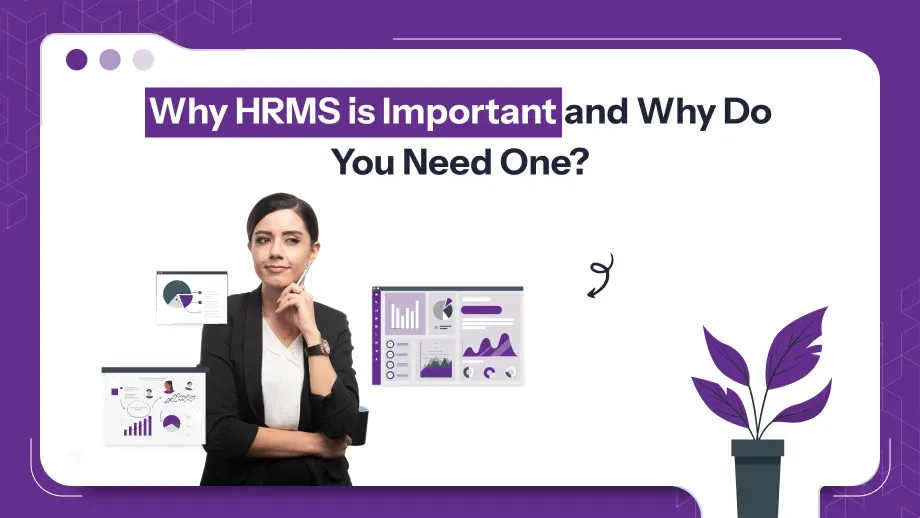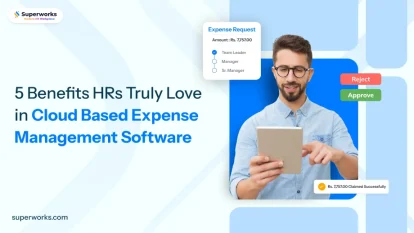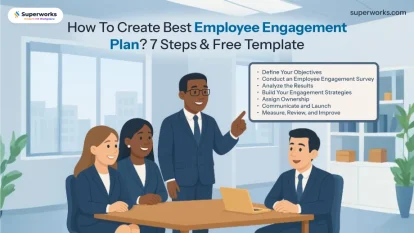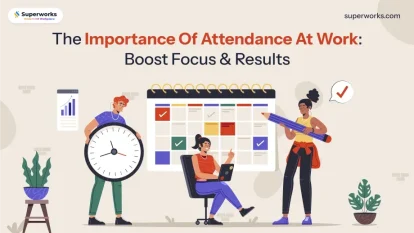
The human resource management system, often abbreviated as HRMS, has become the backbone of most businesses to streamline their HR operations, improve engagement among employees, and ensure compliance. A business operating in a digital age and using manual HR will slow down the operation, bringing inefficiencies along the way. The blog explains why HRMS is important, what its key benefits are, and why businesses need it.
What is HRMS, and what does HRMS do?
An HRMS is a software application that manages and automates most of the HR functions. It combines recruitment, payroll, performance management, and compliance tracking into one system.
HRMS Key Features
- Employee Database Management: Centralized storage of employee records and documents.
- Payroll and Tax Compliance: Automates salary processing, tax deductions, and compliance reporting.
- Leave and Attendance Management: This system tracks the working hours of the employees, their leaves, and shift schedules.
- Recruitment and Onboarding: This feature of HRMS streamlines hiring, resume screening, and onboarding tasks.
- Performance Review: Tracks employee objectives, feedback, and evaluations.
- HR Analytics and Reporting: Provides real-time workforce trend information.
HRMS software saves time, is accurate, and simplifies the experience of HR.
Why HRMS Matters to Companies
Many companies, particularly startups and SMEs, often suffer from poor HR operations mainly because of their manual processes. This results in errors, compliance issues, and low employee satisfaction. The adoption of why HRMS software can transform an HR department into a strategic powerhouse.
Automates and Streamlines HR Processes
Among the greatest aspects of why HRMS is important is automating the difficult tasks of the workforce. From payroll processing to performance reviews, HRMS software removes manual interventions and adds efficiency.
🔹 Example: An HRMS Payroll Software in India can automate payroll processing, tax calculation, and direct salary transfer rather than doing it manually.
Increases Accuracy and Reduces Errors
HR blunders may involve incorrect pay calculations or compliance issues. The risks are minimized with HRMS because the self-calculation process ensures error-proof record-keeping and flags all potential violations concerning compliance.
Improves Employee Experience
Employees today expect seamless HR processes. With a Why HRMS solution, employees can apply for leave, access payslips, and update personal details through a self-service portal. This enhances transparency and reduces HR workload.
Ensures Compliance with Labor Laws
HRMS helps maintain an entity’s compliance with national and international labor laws through record-keeping, report generation, and statutory deduction. Again, an HRMS will manage the Provident Fund (PF), ESI, and PT in India also.
Key Advantages of HRMS
An HRMS solution is a valuable investment for all companies regardless of size because of the following advantages it provides:
Time and Cost Savings
Implementing and use of HRMS reduces paperwork and automates repetitive HR tasks, cutting administrative costs and saving valuable time.
Data Security and Centralization
An HRMS system has an added advantage with the security of having a central and secure database of employee information that will protect employees’ information from unauthorized use, thereby avoiding loss of data.
Advanced HR Analytics
Open-source HRMS equips HR teams with reporting and analytics tools for informed decisions about workforce planning, performance trends, and hiring strategies.
Effortless Employee Onboarding
HRMS makes the new employee’s transition smooth by automating onboarding, including all paperwork, the tasks to be performed, and training schedules.
Integration with Other Business Tools
Most why HRMS solutions integrate with accounting software, payroll systems, and productivity tools, ensuring smooth data flow across departments.
Why HRMS is important?
Because your business deserves a smarter way to manage payroll, attendance, and compliance.
Why You Should Buy HRMS for Your Business
HRMS is an investment for any HR and employee, and it’s a strategic decision that has numerous benefits. Even if it means operating with a small-sized business or large enterprise, having an HRMS saas will enhance the simplification of all HR functions and overall efficiency.
Is Your Business Ready for HRMS?
Here are some signs that indicate the need to buy HR system for your company:
✔️ Frequent payroll errors
✔️ Manual HR tasks consume too much time
✔️ Compliance issues and penalties
✔️ Employee dissatisfaction due to slow HR processes
✔️ Inability to track workforce performance effectively
Choosing the Right HRMS Solution
Before purchasing HR management software, consider:
- Business size and industry requirements
- Scalability and customization options
- Cloud-based vs. on-premise deployment
- Integration capabilities with existing systems
- Customer support and software updates
The Future of HRMS: Trends to Watch
The top HRMS software Advancing technology is changing how businesses relate to handling their workforce. Future HR management will shape a more efficient and data-driven HR landscape, ranging from AI-driven automation to cloud-based solutions. Here are some of the main HRMS trends for the next years.
AI and Automation in HRMS
AI-powered why HRMS solutions are revolutionizing recruitment, employee engagement, and performance tracking. Machine learning algorithms can:
✔️ Automate resume screening and hiring decisions
✔️ Enhance employee sentiment analysis for engagement
✔️ Provide predictive analytics for workforce planning
Cloud-Based HRMS for Remote and Hybrid Workforces
With remote work, cloud-based HRMS is a necessity.
✔️ HR teams to access employee data from anywhere
✔️ Employees to manage self-service tasks on mobile apps
✔️ Real-time updates and seamless collaboration across departments
Employee Well-Being and Engagement Features
Why HRMS is integrating mental health tracking, wellness programs, and employee feedback tools to improve workplace satisfaction. Companies now use:
✔️ AI-driven engagement surveys
✔️ Wellness dashboards for stress management
✔️ Automated check-ins to assess employee well-being
Mobile-First HRMS Solutions
With smartphone adoption rising, mobile HRMS apps are becoming a priority. Features include:
✔️ Mobile attendance tracking and leave applications
✔️ Push notifications for HR updates and approvals
✔️ Viewing payslips, benefits, and company policies through self-service applications
Probably one of the most important business decisions of any startup, small or mid-size enterprise, or even large-scale company would be the selection of the right HRMS software. A well-designed HR management system may ensure the automatic handling of HR processes, compliance, and, in general, workforce efficiency.
This section deals with the best HRMS software for startups and enterprises, the factors to be considered before the selection of a why HRMS solution, and how businesses can benefit from it.
Why do Startups and Enterprises Need HRMS Software?
Startups and large enterprises face different HR challenges that can be effectively managed through an HRMS solution.
HR Challenges Faced by Startups
- Limited HR Resources: There is a small HR team or no dedicated HR personnel, so automation is in order.
- Scaling Workforce Rapidly: Managing employee data, payroll, and compliance becomes difficult as a company grows.
- Budget Constraints: Startups require cost-effective HRMS solutions In India that offer essential features without high costs.
HR Issues of Enterprises
- Managing Thousands of Employees: Enterprises have thousands of employees; hence, manual administration of HR is a significant challenge.
- Compliance Across Multiple Locations: Large companies must comply with local and international labor laws, requiring a robust HRMS.
- Security Issues with Data: Enterprises need secure HR software for sensitive data about employees.
Any kind of HRMS that will automate these four modules: payroll, attendance, recruitment, compliance, and performance management is valuable for both startups and enterprises.
Final Thoughts:
Businesses are no longer allowed to give up on having HRMS software because it helps streamline HR activities from payroll automation to compliance management.
Invest now, if you haven’t implemented HRMS software, and research your options to invest in a reliable best hr software system that will cater to the needs of your business.









